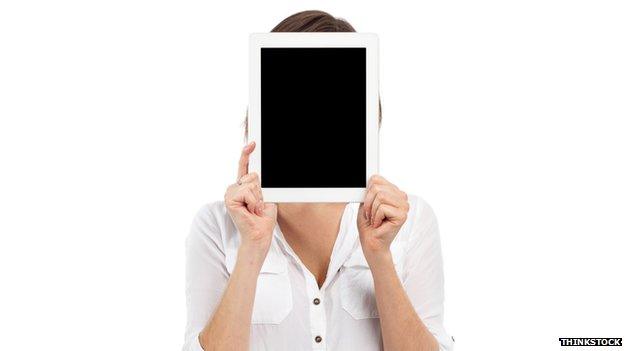Is politics on Twitter a man's world?
- Published

As the UK election approaches, why aren't women tweeting their political views as often as men are?
When Harriet Harman launched Labour's Pink Battle Bus to much ridicule on social media, she told the BBC that over nine million women didn't vote at the last General Election in 2010 "because they just don't think that politicians have any interest in their lives". This time around, all the political parties say they want to reach out to women. But analysis of Twitter activity by BBC Trending appears to show that women are still very much a minority in the political chatter there.
The parties are all trying to reach out to female internet users. Live chats on parenting website Mumsnet, external have become a well trodden part of the online campaign trail. In the last month alone Harriet Harman, the Liberal Democrat Deputy Prime Minister Nick Clegg, the Conservative Housing Minister Brandon Lewis and Green leader Natalie Bennett have taken part.
But it is Twitter, with its 15 million users in the UK, that seems to shape the online political debate more than any other platform. When we looked at the main parties' Twitter hashtags over the past month, we discovered they were overwhelmingly being used by men and not women. Across all the parties, male users seem to be using these hashtags far more often than female -75% of the political party tweets in Britain were from males, 25% female.
There are limits to this kind of analysis, of course. Twitter uses an algorithm to work out what gender you are based on preferences you express, so there could be a significant margin of error. It may also be that Twitter users overall tend to be male, skewing the results, but we don't know for sure. Twitter said it wasn't able to tell BBC Trending how many users in the UK are male or female.
But there was an interesting degree of variation between the parties.
The hashtag #Libdems had the most overwhelmingly male profile, with 84% of its tweets by men (although a smaller party hashtag, #Libdem, had a stronger female showing). They told BBC Trending that women were crucial to their election efforts: "winning over women voters is key to winning in a range of marginal seats," their press office said. "It's certainly something all parties face".
None of the other parties offered us a quote on the issue - but most of them did indeed have a similarly male profile on Twitter. During March #UKIP was the most popular UK political party hashtag, with 80% men and 20% women using it. The #Conservative tag had a similar 80/20 male/female split. The #Labour tag had 76% male users and 24% women.
Interestingly, the Greens and the Welsh and Scottish nationalists - all of which are led by women - had the highest female participation rate. The #SNP tag had 69% male users and 31% women. The #PlaidCymru tag had 38% women compared to 62% men and the Greens had 60% male users, 40% female
Is the prominence of Green Party leader Natalie Bennett, the SNP leader Nicola Sturgeon, and Plaid Cymru leader Leanne Wood responsible for bringing women into the discussion? Matt McGrail of online consultancy Velocity Digital in Edinburgh says yes, at least in the SNP case. "During the Scottish Referendum the debates happening on social media were dominated by male voices", he says. "I had expected a more diverse discussion with the general election because Nicola Sturgeon has been quite open about wanting to promote greater equality for women".
But overall, why don't as many women as men talk party politics on Twitter? The aggressive tone of some Twitter debate and trolling of people for their political views may be something to do with it. Laura Bates, who runs the Everyday Sexism project, external, told BBC Trending that they regularly receive examples of women being threatened with rape, or violent assault as a result of expressing their political opinions online.
"Women are being cut out of the political debate because they do not feel safe posting their political views online" she says. "When I visit schools and speak to young children, they tell me that the trolling and abuse they see directed especially at female MPs puts them off pursuing a career in politics or even offering a political opinion" Twitter told BBC Trending that it's trying to encourage a greater diversity of opinions, but that it relied on users to report trolls.
Are other social media networks any different? The Liberal Democrats told us they had more female followers on Facebook. "Women seem to prefer Facebook where it is less aggressive," they said. "On our Facebook page more women follow us". As BBC Trending has previously reported, much of the discussion about the general election is taking place on Facebook, where there have been more than 21m interactions on the subject - but Facebook told us a male/female breakdown was not available.
Reporting by Hannah Henderson
Next story: The secret world of animated doll videos
You can follow BBC Trending on Twitter @BBCtrending, external, and find us on Facebook, external. All our stories are at bbc.com/trending.